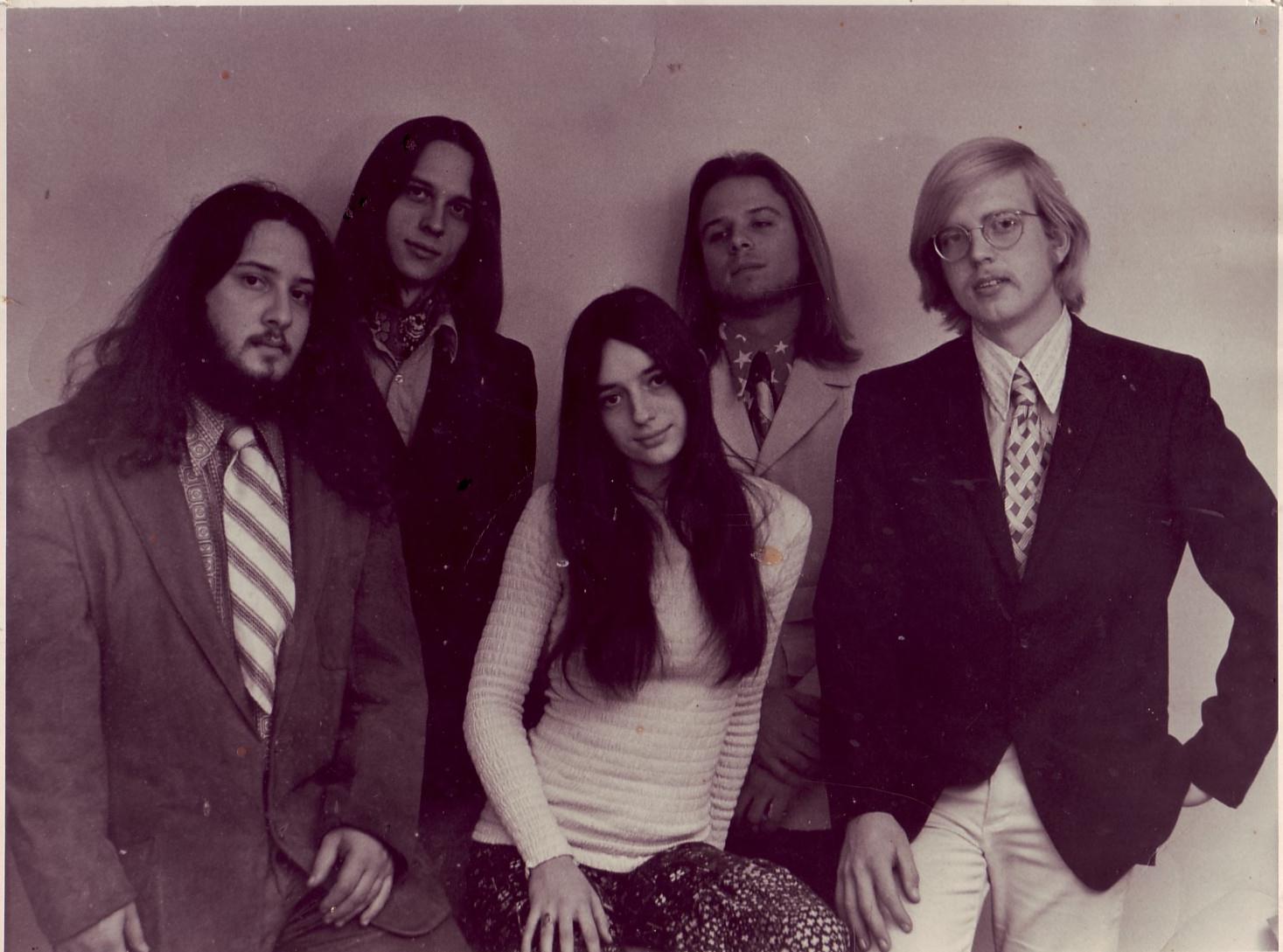
| Home | Early Days |
1968 to 1972 |
The Penetrations |
Lee Stover Trio |
Billy Spears Band |
Used Parts |
The
Richmen Express |
New
Millenium |
Links |
Contact Andy |
About this site |
|---|

|
What do I mean by high
energy?
This cut will show you exactly what I mean. It was recorded at the Red Baron in June of 1972. You can hear the power supply of our poor little P.A.head bottoming out as we exceed its design limits. |
The members.
At the beginning of 1971, Michael Duby and I were looking to put together another band. My memory is pretty hazy about the exact sequence of events, but I'll try to make some sense of it.
The idea was for Michael to play bass; I would play rhythm guitar; we would find a drummer, keyboard player, lead guitarist, and "chick singer." We were to be a "show band." We weren't really too focused on exactly what styles we were going for, as we figured the style would be determined by whom we got to play with us.
In the Spring and Summer of 1971, Michael made friends with Melanie Oldfather, whose father, Charles, was dean of the law school at K.U. Melanie had grown up in Lawrence and her family had a farm - an estate, really - south of town, in the Wakarusa valley. Melanie allowed Michael and me to use that house for musical purposes during that time. We also hauled some hay while we were there. That is hard work.
With more spare time than sense, Michael and I put together a "demo" of what we thought might be good. It included "Gimme Shelter" by the Rolling Stones, "Every Day" by Buddy Holly, and an original or two. I think I played all the instruments on that tape, except for we paid a kid from central Kansas (Dawayne Bailey) to play lead guitar on a couple of numbers. With only a two-track reel-to-reel recorder, I made heavy use of sound-on-sound and bouncing tracks.
Melanie also invested some money in the venture, which, I suppose, is how we came to have some decent equipment.
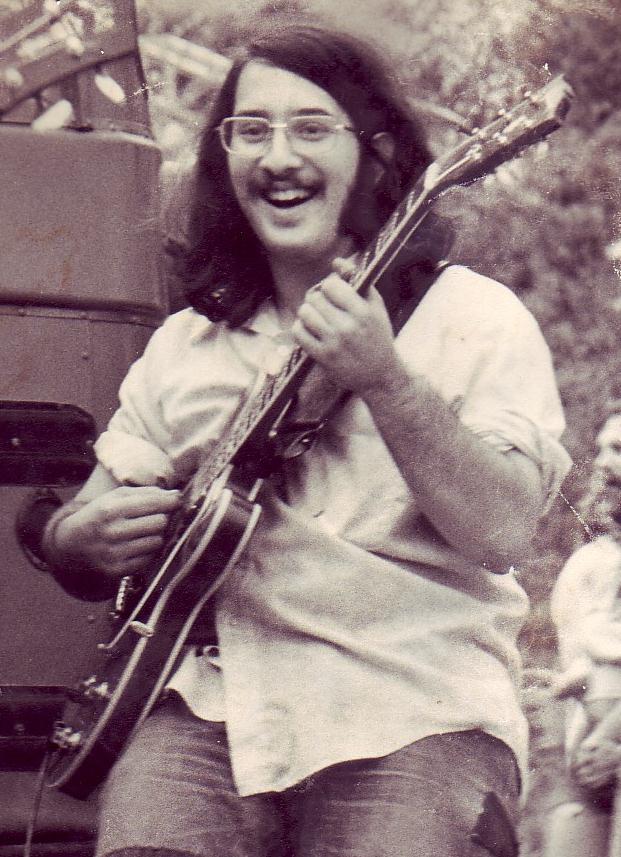 |
Darrell Katz I had played one gig, on bass, in Topeka with Lee McBee (singer & blues harpist) and Darrell Katz on guitar. Those guys both lived in what was then called the CIA (Campus Improvement Association) House, just south of 14th and Indiana in Lawrence. I believe Darrell, a fellow fan of Robert Crumb and B.B. King, was the first musician to "sign on" for our new band. Here's how Darrell remembers it: "I auditioned for the new band, but didn't make the cut when it was first started. Shortly after, though, either you guys changed your mind, or whoever you got instead split, and I was in. But you'd already been rehearsing with Brad and Bud for awhile." I don't know who's right... Darrell generally underestimated his own playing. In a time when many guitarists were using effects, trickery, and wankage, Darrell used only his brain, fingers, Gibson ES-345 and Fender Twin Reverb. He always got a great sound and propelled our music to greater heights. He was also a student of roots music, turning us on to some great stuff. The photo to the left shows Darrell in 1973 at a gig at Potter's Lake on the K.U. campus. In the background is our 1960 International Harvester converted school bus. |
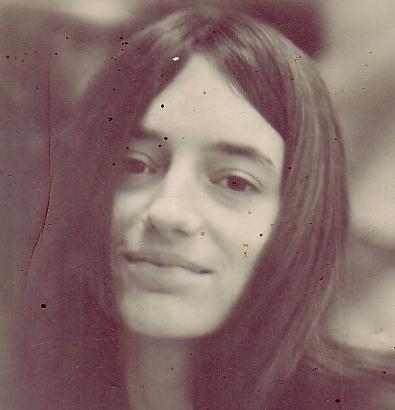 |
Becky Reed
I believe that Melanie Oldfather was attending K.U. at the time and knew a guy (John Reed) who had a sister who sang and was interested in joining a band. Her name was Becky Reed. She'd gone to high school in Independence, Kansas. Prior to joining us, Becky had had a short stint singing with a band in Ottawa, KS. We got Becky out to Melanie's house for an audition. I think it was Darrell, Michael, and I, at that point. The songs Becky did that just knocked us out were Janis Joplin's "Down on Me" and Aretha Franklin's "Chain of Fools." And... she was just stunningly beautiful. It was hard to believe that all that sound was coming from that beautiful little person. We knew we'd found our singer! Becky Reed. |
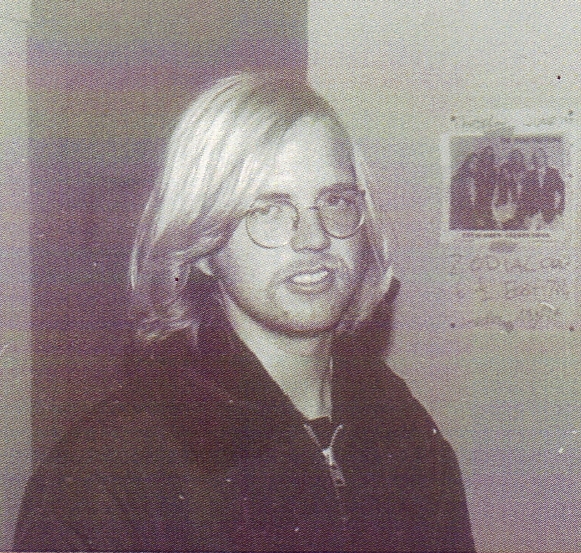 |
Brad Reynolds
I believe we found Brad Reynolds through a want ad, perhaps posted at Richardson's Music. He grew up in Ottawa, Kansas, the son of a hardware-store owner. Brad was really smart, a pretty wholesome guy with a subversive side. He became our keyboardist. He also played acoustic guitar, but not on stage with the Penetrations. At first, he wanted to play folky stuff like Tim Hardin's "Reason to Believe," but he also liked the Beatles (and who doesn't?). Heres's what Darrell said about Brad: "Brad told me, when he was here last year, that what he was into when he joined the band, was 'hard rock.' Though your descriptions seems more like what I pictured. He wasn't into what the rest of us were, though (but he sure learned it well: Brad was really a talented sum'bitch)." Here's a cut of us doing Hey, Bulldog, the Beatles song, with Brad taking the lead vocal and Becky singing harmony... don't know where it was recorded. I don't believe this song lasted long in our repertoire, but we did it justice, I think! Dark and intense. The photo at left shows Brad playing at a gig in Omaha in 1973. The spots are on the photograph, not his shirt... |
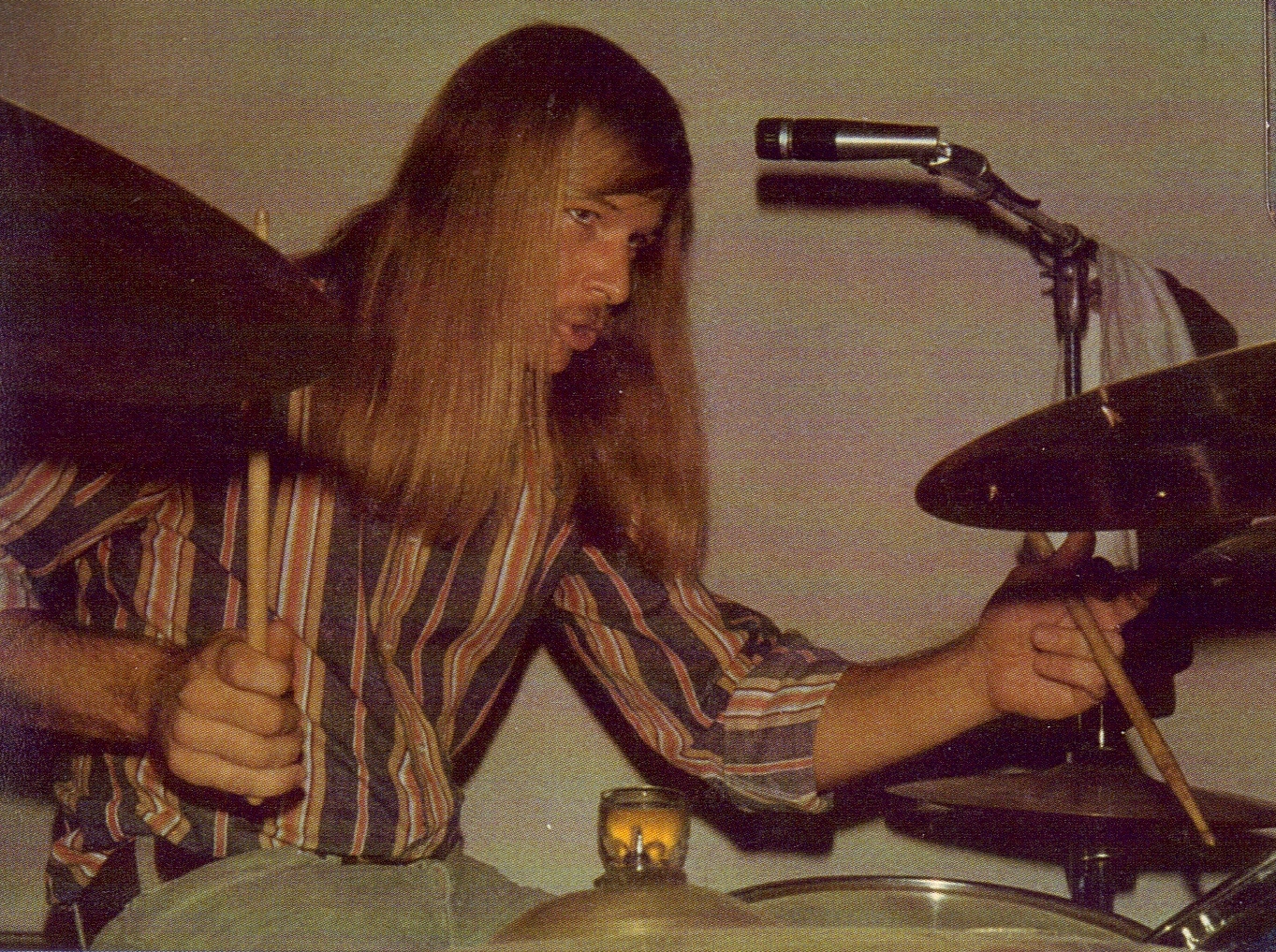 |
Bud Pettit
Michael and I had played with Bud before and he was simply
the best. Some drummers are musicians and some are
not. Bud was and is a musician of genius.He grew up in Winfield, Kansas. As a young boy, he saw Lionel Hampton on TV and knew immediately that he wanted to do that (one night, the band went to the Colony Steakhouse and caught Lionel Hampton live). Prior to joining the Penetrations, Bud played with Jerry and the Jukes, fronted by Jerry Wood of "Finnegan and Wood" fame. Bud was formally trained, so he had a solid facility with the rudiments, but he also played with power and creativity. Bud also sang all our high harmony parts. |
Wormwood for a little while.
The first name of the band was Wormwood - definitely a Duby idea. Remember that, at this point, Michael Duby was the bass player. We started practicing several nights a week. I think we played a gig or two at Edith's Beer Place on Mass. Street as Wormwood. We were not particularly well received.
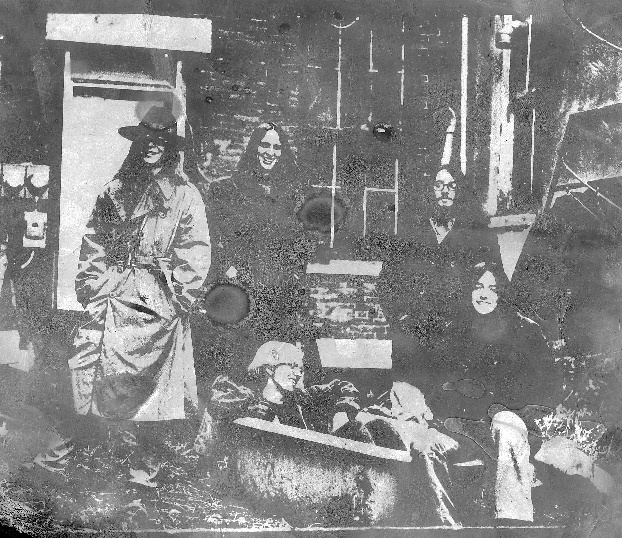 |
The Loft - 706-1/2 Massachusetts
Michael had rented a loft above Burk Awning at 706-1/2
Massachusetts Street, and I had a tiny apartment in the same
building. The loft was huge, and it became our
practice space. When the Penetrations started, I
gave up my little apartment; Becky and I took part of the
loft to live in, and Michael took another part. Brad
lived there too, for a while. I remember that, during
this time, I ingested a lot of white crosses and swept the
floor a lot. We ate what I would call "glop du jour,"
something cheap with beans or rice or canned mackerel, or
home-baked bread, or fried potatoes. We were all
living in poverty, self-imposed by reason of our commitment
to our music.The photo at left, reproduced from a damaged negative, shows us in the alley behind Burk Awning, in early 1972. From left, Bud, Andy, Brad in bathtub, Darrell, and Becky. |
Changes.
All of us except for Michael were mostly listening to music created by great black performers: Ray Charles, Aretha Franklin, Big Joe Turner, James Brown, Etta James, Sam and Dave, Otis Redding, etc... so, of course, we wanted to play that music. Once Brad discovered Otis Spann, he jumped on the bandwagon as well and learned to play the blues in an amazingly short time.
It soon became fairly obvious that Michael's bass playing was a hindrance, and that his stylistic desires didn't jibe with those of the rest of the band. We didn't want to do his original songs,and he didn't share the rhythm-and-blues gestalt. We convinced him to bow out, but we would be under his management - "Persuasion Productions." We also changed the band's name to The Penetrations.
This move also allowed me to take up playing bass full time, which was good, as I had never been very facile on the 6-string guitar. Some people are particularly-well-suited to a specific instrument, and bass was my bag. At first, I could only play bass with a pick; you can hear that in the Penetrations' early recordings. Over time I learned to play with my fingers, and my tone - and note selection - improved. I can't think of any bassists in the rhythm-and-blues field who play with a pick. Okay, there's Carol Kaye... but she was so good she could do it however she wanted.
Buddy was such a good drummer that it was easy for me to "lock in" with him; solid rhythm was definitely a forte of the band.